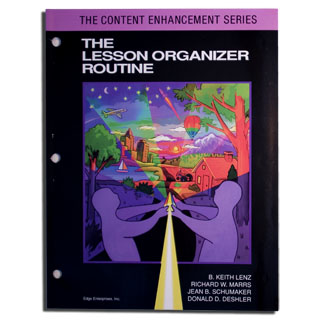
Publication Info: Edge Enterprises, 1993
Lesson Organizer Resources:
VIDEO
- The Lesson Organizer Routine: Video
PPTs
MORE
- Access Content Enhancement Routine Checklists
- Description of the Lesson Organizer from the SIM website
MICROCREDENTIALS
Stratenotes/Strategram
- Strategram Vol 6, No. 3 March , 1994: The Lesson Organizer Routine - Improving Performance in Academically Diverse Classes
- Strategram Vol. 7, No. 2, January 1995: Lesson Organizer memo for parents and students
- Stratenotes Volume 2 Issue 5, February, 1994 A walk through
Research
- Lesson Organizer Routine Research slide
- Lenz, B.K., & Adams, G. (2006). Planning practices that optimize curriculum access. In D.D. Deshler & J.B. Schumaker (Eds.), Teaching adolescents with disabilities: Accessing the general education curriculum (pp. 35-78). Thousand Oaks, CA: Corwin Press. This chapter reviews issues related to planning for students with disabilities, different kinds of planning interventions, and studies on teacher planning, including a review of lesson planning, unit planning, and course planning research.
- Mittag, K.C., & Van Reusen, A.K. (1999). One fish, two fish, pretzel fish: Learning estimation and other advanced mathematics concepts in an inclusive class. Teaching Exceptional Children, 31(6), 66-72. Using a combination of research-based approaches (Cooperative Estimation Techniques, calculators, and the Lesson Organizer Routine), a team of teachers successfully taught fifth-grade students in an inclusive classroom to use various strategies to learn advanced mathematics concepts and skills.
